- Home
- Richard Powers
The Gold Bug Variations
The Gold Bug Variations Read online
Richard Powers
* * *
THE GOLD BUG VARIATIONS
Contents
Aria
Chapter I
Chapter II
Chapter III
Chapter IV
Chapter V
Chapter VI
Chapter VII
Chapter VIII
Chapter IX
Chapter X
Chapter XI
Chapter XII
Chapter XIII
Chapter XIV
Chapter XV
Chapter XVI
Chapter XVII
Chapter XVIII
Chapter XIX
Chapter XX
Chapter XXI
Chapter XXII
Chapter XXIII
Chapter XXIV
Chapter XXV
Chapter XXVI
Chapter XXVII
Chapter XXVIII
Chapter XXIX
Chapter XXX
Aria
About the Author
Richard Powers is the author of twelve novels, including The Overstory (winner of the Pulitzer Prize for Fiction and shortlisted for the Man Booker Prize), Orfeo (longlisted for the Man Booker Prize), The Echo Maker and The Time of Our Singing. He is the recipient of a MacArthur grant and the National Book Award, and has been a four-time NBCC finalist. He lives in the foothills of the Great Smoky Mountains.
ALSO BY RICHARD POWERS
Three Farmers on Their Way to a Dance
Prisoner’s Dilemma
Operation Wandering Soul
Galatea 2.2
Gain
Plowing the Dark
The Echo Maker
The Time of Our Singing
Generosity: An Enhancement
Orfeo
The Overstory
RLS CMW DJP RFP J?O CEP JJN PRG
ZTS MCJ JEH BLM CRR PLC JCM MEP
JNH JDM RBS J?H BJP PJP SCB TLC
KES REP RCP DTH I?H CRB JSB SDG
Aria
THE PERPETUAL CALENDAR
I.
What could be simpler? Four
scale-steps descend from Do.
Four such measures carry over
the course of four phrases, then home.
At first mere four-ale, the theme swells
to four seasons, four compass points, four winds,
forcing forth the four corners of a world
perfect for getting lost in
or for filling, by divide and multiply.
Four secret letters, tetragrammaton,
start to speak themselves, the tune
doubling down a net of no return.
What could be simpler? Not even music
yet, but only counting: Do, ti, la, sol.
Believing their own pulse, four tones
break into combinations, uncountable.
II.
From language to life is just four letters.
How can that awful fecundity come
from four semaphores, shorthand and dumb,
nothing in themselves but everything?
Gene-raining cascade, proliferating green
tints, varieties senseless except for their own
runaway joy in the explosion. Fresh phloem-
pipes, palisades, leaves ripe for insect-aping.
All patterns patented: gyro, chute, receiver,
fish that track ocean back to first stream
or steer pitch black by trapped bacterial beams.
Can egg-chaos really be all the blueprint needed
to father out this garden-riot from just seed?
No end to the program except a breaking out
in species-mad experiment, sense-shattered shout,
instruction-torrent: live, solve, copy This, repeat.
III.
Two men, two women, their requisite friends,
acquaintances, strangers and impediments,
two couples at arm’s length of thirty years bend
in ascending spiral dance around each other.
All four have traveled far from home
and, in the hour when they need it most,
the grace of reference works won’t come
to cure the persistent call of tonic.
“Picture those pay telescopes,” he said,
“that sprout up at scenic views. Ten cents,
a minute’s panorama, then it snaps dead.
Clicks shut. Cut off. And you with no more change.”
All four must make a full tour of the curse,
and deep in variation, for a moment, lose
the four-note theme, sight of each other, worse.
Drowned by the pump and swell, the flood of dates.
IV.
The calendar’s fresh beauty is how it runs
through perpetual days, calling us on
to the urgencies of life science, old names,
genus, species: May Thirds, March Twenty-ones.
Everything that ever summered forth starts
in identical springs, or four-note varia-
tions on that repeated theme: four seasons,
four winds, four corners, four-chambered heart
in four desire-trapped bodies in the thick
of a species-swarmed world where green thrills
to countless change while the calendar holds still.
Winter works again, through autumn’s politics,
its call to action, critical count of votes:
Look, speak, add to the variants (what could
be simpler?) now beyond control. How can we help
but hitch our all to these mere four notes?
I
THE CARE AND FEEDING OF FOREIGNERS
Word came today: four lines squeezed on a three-by-five. After months of bracing for the worst, I am to read it casually, jot down the closing date. The trial run is over, Dr. Ressler dead, his molecule broken up for parts, leaving no copies. I can neither destroy the note nor keep from rereading it. The news is a few days cold. I’ve had a year’s advance warning. But I haven’t time enough left in my own cells ever to figure it. The mechanical music box, his body, has had its last crack at the staff. Those four notes, four winds, four corners of a world perfect for getting lost in are lost in a sample mean.
Once, when he talked, I could almost follow in him the interior melody from the day of creation. For a few months, I’d had that tune by ear. Now nothing. Noise. I read the note all evening, waiting for the clause that will make sense of it. The only volunteer words are his: Dr. Ressler, leading the way through winter violence, the snowstorm that trapped the three of us in a vanished cabin, laying out all natural history with an ironic shrug: “What could be simpler?”
I had a hunch it would come now. For a week, unseasonably cool— brisk, blustery, more like summer’s end than its beginning. Last night the cold peaked. I slept under a parfait of wool, the weight required to keep me under. Giving in to an irrational fear of courants d’air brought on by too much literature as a girl, I sealed the apartment. No one around any longer to object. Excited by night chill, the signal hidden in temperature, I fell asleep only by degrees. I lay in the metal-cold sheets aware of every pore, unable to keep from remembering. Something was about to happen. Hurried lingering, hope, as always, a function of weather.
I passed through that hybrid state just short of dream, back to that iridescent weekend in the woods. The familiar world overhauled, encased in silver sealant. We three waded again across the glacial surface: spectral trees glazed with lapidary. Bird and squirrel fossils marked the drifts. Snow obliterated paths, spun power lines into flax, confected hedgerows, dressed our cabin in gothic buttresses and finials. I walked through the transmu
ted place beside my two males, one in herringbone, the other in navy pea. Dr. Ressler walked between Franklin and me, pointing out astonishments in the altered world, his features as angular as the shepherd’s wonder from my childhood crèche. The seashell loops of his ears, his fleshless nose, reddened in the acute cold, while his lashes doilied with flakes that beaded across his mat of hair.
We pressed deeper into the snowscape, the bronchi-passages of a walk-in lung. Franklin and I placed our hands under each other’s coats, pleading conservation of heat. In bed, my skin still recorded the year-ago cold of that boy’s fingers against my ribs. Ressler saw everything: the bark swells of insect galls, the den entrance punched through hardened powder. He certainly saw how Franklin and I kept warm, and treated it as easily the most explicable of winter mysteries. At his finger-points, the arcade of frosted branches became vault ribbing. His each wave populated the landscape, pulling Chinese lanterns out of flat sheets. He crumpled to his knees in the snow, shook his head in incomprehension, and like the crystal world, seemed about to splinter. He must have solved again, with fierce looking, the ladder of inheritance, because his face turned and he swung his eyes on us expectantly.
Piled in blankets, I slowed the dream, kept him from speaking, prolonged the endangered moment that would shatter at the least formula. His throat tensed; his lips moved soundlessly like a remedial reader. He became that pump organ we had played six-hands, about to produce the one phrase sufficient to hymn this mass of brute specifics. The traces of creatures, all the elaborating trills and mordants of winter seemed a single score, one breathing instrument whose sole purpose was to beat the melodic line of its own instructions—four phrases, four seasons, every gene the theory of its own exposition. He was about to hum, in a few notes, the encoded thread of everything happening to us and everything that would fail to happen. But his lips—thin, boyish, blue, wasted in middle age—could not shake loose the first pitch.
As before, Franklin challenged him. “You’re the life scientist. Tell us what’s afoot here.” Every detail of Ressler’s face grew magnified: the interstate lines of folded neck, his frozen-brittle lobes, the spot on his chin thawed by breath. His viscera, the process even then growing more variegated, already knew the tumor. This time Dr. Ressler gave no reply. He had gone, slipped out from under the weight of white.
Then, this morning, just waiting for me to commit wrongly, summer chose its moment to break. The pressure system stalled above the city passed over, at last bringing the weather the calendar called for. Overbundled in the airless room, I woke up soaked in flannel. I sponged clean, washed my hair, ate an insignificant breakfast, and brushed my teeth without conviction. I sat in the dining nook, in the first, full heat of summer, trying to retrieve that snowscape. Awake, I let the man ask the question I’d earlier forestalled: what could be simpler? He remained a geneticist despite everything, partial to the purposive pattern, the generative thread. But his four-phrased, simple explanation was as unrecoverable from my breakfast table as that New Hampshire weekend, the whole aborted year.
Fragment, endorphin-induced, absolutely commonplace: easier to count the nights when I don’t dream of those two than when I do. Still, this one torched my morning. I filled with the urge to make the call, but had no number. I came within a dot of dashing off the telegram composed since last spring, but knew no sending address. The way back, the suggestion forced open again overnight was sheer perversity. I sat at the breakfast table until the moment passed. Then I made my way to the archives.
I was first at work, always easiest. I unlocked the library and headed by rote to the Reference Desk, my half-dream still an embryo in me. The day would have been long in any event. The longest day of the year, even had I gotten eight good hours. By ten, I found myself seriously questioning the charter of a big-city branch library. Our catalogued, ecumenical clearinghouse of knowledge was running at about double average gate. Kitty-corner to me, a pack of pubescents prowled the genre racks, eyes on the signaling flesh at adjoining tables. A few bruised retirees, two years from terminal Medicare, pored over magazines, persisting in forcing the weekly news into a parody of sense. In the adjoining children’s room, a pride of early readers, spirits not yet broken by summer camps, disguised the fact from their unwitting parents that books mystified them more than the real world. Behind the Reference Desk, on the peak day of our peak season, I fielded questions from this community of needs. First day of summer: briefly, everyone wanted to know something about nothing. I shook off Dr. Ressler’s rhetorical question, agitating out of all proportion to the intervening silence, and busied myself with questions that were at least answerable.
This morning, I was glad for the diversion. By noon, I had solved a burning problem concerning obscure wording on W-4 forms, pointed out the Bridge and Dog Grooming books, and located, for an earnest navigator of sixteen, a side-by-side comparison of Mercator’s, Mollweide’s, and Goode’s projections. I went home at noon. I’ve taken to it lately, despite losing most of the hour in the trip. I felt the urge to buy a car, not to drive, impossible in the city, but as prep for the increasingly likely evacuation. Home, I swept the mailbox by limp reflex. Franklin’s note cowered in protective coloration amid bank statements and time-limited offers. I took it with the numbness of months. I can’t remember the flight up or breaking through the deadbolts. I set Todd’s calligraphic scrawl on the kitchen table and began pulling vegetables systematically from the bin. Hysterical affectation of indifference: make myself a bite to eat before settling down to death. The snowstorm came back, the hunch that sent me home for lunch, and I tried on the idea: I’d known. Then I remembered Ressler’s definition of chance: the die is random, but we keep rolling until we hit necessity. Hunch long enough, and premonition will one afternoon be waiting for you at home. I left the vegetables salad-bar-style across the cutting board and sat down, worried open the seal. Stiff, white invitation card:
Our Dearest O’Deigh,
It’s all over with our mutual friend. I’ve just this instant heard. The attendant at the testing center assures me that all the instruments agree: Dr. Ressler went down admirably. No message, or, I should say, no new message. I wanted to inform you right away, naturally.
Naturally. Also naturally, no signature. He printed “FTODD” at the end, as if authorizing a change of date on a bank draft. But he could not help adding an afterthought at bottom: “Oh, Jan! I miss you right now. More than I would miss air.”
I spread my hands on the table and divorced them. Through a tick in my eyelid, I pointlessly read the note again. All over with our friend, his four-letter tune. I knew the man for a year, one year ago. Before everything fell apart, he became one of the few who mattered to me in the world. Once, when he was young, he stood on the code’s threshold, came as close as any human to cracking through to those four shorthand semaphores. Then, for years, he went under. Slowly, astonishingly, as Franklin and I watched, he awakened. Now, stripped of content, he was gone.
What did it mean, “went down admirably”: resisting or acquiescing? And what possible difference could it make to me now? Dr. Ressler was dead. No shock, not technically. Given his disease, he wasted and died per timetable. But, backwater organism, I’m no good at abstraction. A lifetime of practice unmade in a minute. And I learn again, in my nerve endings, that information is never the same as knowledge.
TODAY IN HISTORY
I met him in ignorance, a day into autumn of 1982. Another half year passed before I learned his name. I pinpoint the date through the Event Calendar, one of those well-meaning services I supervise daily for an indifferent audience. Research, edit, type, and list for the consumption of the dabbling public what, if anything, happened today in the past, ignoring the contradiction in terms. For five years I’ve posted the day’s event, finding exactly the right bite-sized fact to feed the public library patron. Five years times fifty weeks times five days is 1,250 daily facts. The public librarian’s knocking out of the weekly cantata. Something to do. Un
til today.
The race is constantly sneaking up to something: space shots, cathedrals, mill strikes, expeditions, inventions, air disasters, revolutions, epochally indecisive battles, world-shaking books, commercial upheavals, pogroms, putsches, treaties. A few sources provide enough grist for every day of the solar mill for years to come. If I’d ever run out, the human activity since I began hunting would have carried me through at least another year. I never fell back on birthdates of famous people, cheating in my book. I still have on file every Event I ever posted. After five years, my selections blend into a reference work in their own right. Years after my first run-in with the ex-scientist, putting together the stray pieces, I can look up the particular notice that caused the Franciscan of 4th Street to break down and—against character—address a perfect stranger. I arrived at the library early enough one September in ’82 to pick, type, and post the item within fifteen minutes of the branch opening for business:
September 26
In 1918, after four years of total war, the Allies launch an offensive along the Western Front that will break the Hindenburg Line. Two weeks later, World War I formally ends on the eleventh hour of the eleventh day of the eleventh month. The following year, touring the U.S. to drum up support for the new League of Nations, Woodrow Wilson collapses with his first incapacitating stroke. With him collapses any hope for the League.
I have the provoking entry here in front of me. As I pinned it to the board, a hand chopped me on the clavicle. I fell back at the capacitance, thinking that someone had stuck me with a knife. I now know that the man had gone so long without touching that his muscles had simply forgotten how light a tap need be to attract attention. I turned to see a figure shorter than average, small-framed, with a beautiful, skeletal face and skin resisting the sag of age. His forehead arced down into thin nose cartilage, and his lower lip shaded indistinctly into a long chin. Had he not been anemic, his crew cut might have made him an astronaut. His extraordinary moist eyes monitored me with the soft hurt of animals, encouraging me to say the worst. He seemed not to blink, like a camp refugee or feebleminded ward of state.

 The Overstory
The Overstory Bewilderment
Bewilderment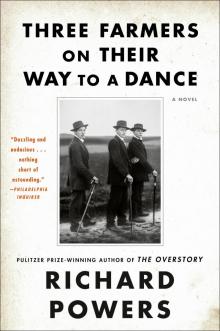 Three Farmers on Their Way to a Dance
Three Farmers on Their Way to a Dance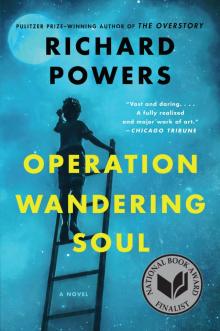 Operation Wandering Soul
Operation Wandering Soul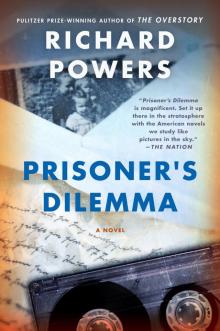 Prisoner's Dilemma
Prisoner's Dilemma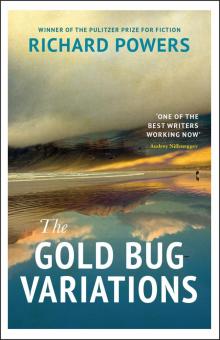 The Gold Bug Variations
The Gold Bug Variations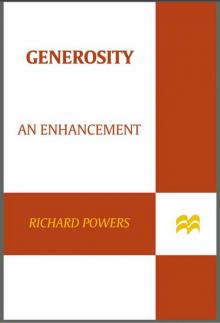 Generosity: An Enhancement
Generosity: An Enhancement The Echo Maker
The Echo Maker Orfeo
Orfeo The Time of Our Singing
The Time of Our Singing PLOWING THE DARK
PLOWING THE DARK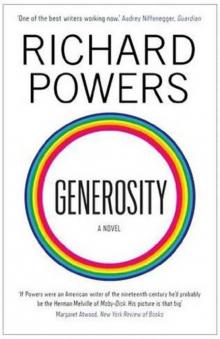 Generosity
Generosity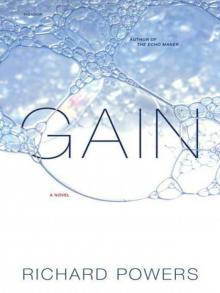 Gain
Gain